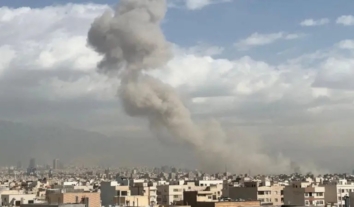Amnesty International: Death Penalty on the Rise
Normal
0
false
false
false
RU
X-NONE
X-NONE
/* Style Definitions */
table.MsoNormalTable
{mso-style-name:”Обычная таблица”;
mso-tstyle-rowband-size:0;
mso-tstyle-colband-size:0;
mso-style-noshow:yes;
mso-style-priority:99;
mso-style-qformat:yes;
mso-style-parent:””;
mso-padding-alt:0cm 5.4pt 0cm 5.4pt;
mso-para-margin-top:0cm;
mso-para-margin-right:0cm;
mso-para-margin-bottom:10.0pt;
mso-para-margin-left:0cm;
line-height:115%;
mso-pagination:widow-orphan;
font-size:11.0pt;
font-family:”Calibri”,”sans-serif”;
mso-ascii-font-family:Calibri;
mso-ascii-theme-font:minor-latin;
mso-fareast-font-family:”Times New Roman”;
mso-fareast-theme-font:minor-fareast;
mso-hansi-font-family:Calibri;
mso-hansi-theme-font:minor-latin;}
Human rights advocates are alarmed by the number of countries that used in death penalty 2014 in response to real or perceived threats to state security and public safety posed by terrorism, crime, or internal instability.
This was announced by Amnesty International who published its 2014 annual report on death sentences and executions worldwide.
Death sentences jumped by more than 500 in 2014 compared with the previous year, largely because Egypt and Nigeria handed out hundreds of death sentences, some in mass trials. At the same time in 2014 there were fewer executions compared to the previous year, and several countries have made steps towards the abolition of the death penalty.
There is no evidence that the death penalty has a greater deterrent effect on crime than terms of imprisonment. Where governments present the death penalty as a solution to crime or insecurity they are not only misleading the public but – in many cases – failing to take steps to realize the goal of abolition recognized in international law.
“It is shameful that so many states … are essentially playing with people’s lives – putting people to death for ‘terrorism’ … on the ill-conceived premise of deterrence” says Salil Shetty, Secretary General of Amnesty International.
China carries out the most executions in the world. In 2009 Amnesty International stopped publishing the organization’s estimated figures on the use of the death penalty in China, where data on capital punishment is considered a state secret. However, available information indicates that thousands of people are executed and sentenced to death in China each year. Apart from China, which executes more people than the rest of the world combined, Iran (289 officially announced and at least 454 more executions in addition to those), Saudi Arabia (90+), Iraq (61+) and the USA (35) made up the world’s top five executioners.
The following methods of executions were used: beheading (Saudi Arabia), hanging (Afghanistan, Bangladesh, Egypt, Iran, Iraq, Japan, Jordan, Malaysia, Pakistan, Palestine, Singapore, Sudan), lethal injection (China, USA, Viet Nam) and shooting (Belarus, China, Equatorial Guinea, North Korea, Palestine, Saudi Arabia, Somalia, Taiwan, UAE, Yemen). Public executions were carried out in Iran and Saudi Arabia.
People continued to be sentenced to death or executed for crimes that did not involve intentional killing, and therefore did not meet the threshold of “most serious crimes”, as prescribed by Article 6 of the International Covenant on Civil and Political Rights (ICCPR). The death penalty was imposed or implemented for drug-related offences in a number of countries, including China, Indonesia, Iran, Malaysia, Saudi Arabia, Singapore, Sri Lanka, Thailand, UAE and Viet Nam.
Other capital crimes which did not meet the standard of “most serious crimes” but for which the death penalty was imposed in 2014 included: economic crimes such as corruption (China, North Korea and Viet Nam); armed robbery (DRC); committing “adultery” while married (UAE); rape that resulted in death (Afghanistan); rape committed by repeat rape offenders (India), rape (Saudi Arabia, UAE); kidnapping (Saudi Arabia); torture (Saudi Arabia); “insulting the prophet of Islam” (Iran); blasphemy (Pakistan); “witchcraft” and “sorcery” (Saudi Arabia).















